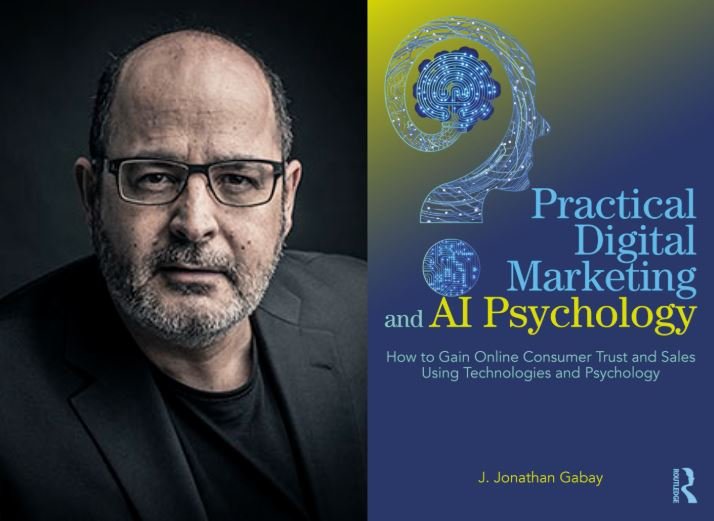Jonathan Gabay on Brand Trust in an AI world
Truth, Trust, and the AI Revolution: Rewriting Brand Equity in an Era of Distrust
In high-stakes marketing, trust fuels loyalty, amplifies advocacy, and strengthens customer relationships, turning one-off transactions into lifelong partnerships. Yet, in 2024, trust is eroding faster than ever.
The Edelman Trust Barometer reports that 56% of people distrust advertising. This statistic isn’t just a data point—it’s a battle cry for marketers to rebuild authenticity in an era dominated by scepticism and AI-driven disruption.
What’s undermining trust? A proliferation of misinformation, the intrusive use of AI, and manipulative tactics like dark UX deserve closer scrutiny.
Dark UX: The Silent Saboteur
Dark UX, or "dark user experience," refers to deceptive design tactics that mislead or pressure users into actions they wouldn’t typically take. Think of subscription traps, hidden fees, or convoluted cancellation processes.
These techniques prey on psychological vulnerabilities, leveraging cognitive biases to drive short-term gains.
For example, “roach motel” patterns such as putting in hurdles to unsubscribe or close an account make leaving infuriatingly tricky.
To marketers, dark UX might seem like a clever optimisation tool, but its effects are corrosive. Users are increasingly aware of these tactics and swiftly punish brands that exploit them.
A 2023 Norwegian Consumer Council report exposed platforms like Amazon for making unsubscribing unnecessarily arduous. The backlash was immediate, tarnishing Amazon’s reputation despite its global dominance.
For marketers, the takeaway is clear: short-term wins through deception inevitably lead to long-term trust erosion. The consumer’s growing sophistication leaves little room for underhanded tactics.
Advertising’s Trust Problem: A Legacy of Scepticism
Distrust in advertising predates the AI revolution. Over decades, exaggerated claims, over polished messages, and opaque corporate motives have fostered scepticism. Digital platforms amplified this distrust through algorithmic opacity, personalised pricing, and targeted advertising, which many consumers find invasive rather than helpful.
Psychological phenomena compound these issues.
Take confirmation bias, where people gravitate towards information that aligns with their beliefs. Even well-intentioned campaigns risk alienating audiences who perceive them as manipulative. Worse, efforts to correct misperceptions can backfire—a phenomenon aptly named the backfire effect.
Recent missteps illustrate these risks. In 2023, Bud Light partnered with a transgender influencer in a gesture of inclusivity, but its core customer base saw the move as inauthentic. The result? A 26% sales decline in just one month. This case underscores a brutal truth: modern audiences don’t just evaluate a brand’s message; they scrutinise its motives.
The financial implications of distrust are profound. Research from Deloitte shows that 88% of consumers will repurchase from a trusted brand, even at a premium.
Trust is necessary for customer loyalty to vanish, acquisition costs skyrocket, and brand equity deteriorates.
What Builds Trust Today?
As we approach 2025, trust evolves beyond product quality or accurate claims. It hinges on three interlocking pillars:
Competence: Can the brand reliably deliver on its promises? Competence is the minimum requirement.
Integrity: Does the brand operate ethically and transparently? Inconsistencies between stated values and actions are fatal.
Benevolence: Does the brand genuinely care about its customers? Benevolence transforms transactional relationships into emotional connections.
Brands that falter on any one pillar risk alienating their audience. A technically competent but unethical company will lose credibility, while a benevolent brand that fails to deliver results will appear ineffective.
AI: The Double-Edged Sword of Trust
Artificial intelligence is reshaping marketing, enabling hyper-personalisation, predictive analytics, and automation at scale.
Done well, AI enhances trust.
For instance, Spotify’s "Discover Weekly" playlist uses listening behaviour to craft personalised recommendations that feel intuitive and emotionally resonant.
Similarly, Netflix’s algorithmic suggestions create a sense of being understood—an increasingly rare feeling in an era of generic mass communication.
However, AI’s dark side is just as significant. Algorithmic bias—where AI systems inadvertently favour certain groups or outcomes—can alienate entire segments of an audience.
Personalisation, when poorly executed, feels intrusive, as though brands are mining private moments for profit. Consider dynamic pricing, where consumers are charged different amounts for the same product based on data. Without transparency, such practices appear exploitative, breeding resentment.
AI can either build trust or destroy it; the deciding factor is transparency.
Consumers trust what they understand.
Google’s "About This Result" feature, which explains why a specific search result appears, is a benchmark for demystifying AI. Brands that fail to justify their AI decisions risk feeding consumer suspicion—a mistake no brand can afford in a sceptical marketplace.
Strategies to Rebuild Trust with AI
To navigate this complex landscape, marketers must prioritise trust-driven AI strategies:
Explainable AI: Demystify how AI makes decisions. Transparency builds confidence, whether it’s about pricing algorithms or content recommendations.
Ethical Data Stewardship: Follow Apple’s lead by ensuring data privacy and security. Ethical practices not only protect users but also enhance a brand’s reputation.
Human-AI Collaboration: Automation works best when paired with human empathy. Bank of America’s "Erica" chatbot combines efficiency with human support, escalating complex issues to real advisors.
Proactive Listening: Use AI-driven sentiment analysis to monitor real-time customer feedback, addressing concerns before they escalate.
Authentic Social Proof: Highlight credible reviews and endorsements. Consumers trust each other far more than they trust brands.
Consumer Psychology and the Fragility of Trust
Trust is inherently fragile, and consumer psychology explains why. Negativity bias, the tendency to prioritise negative experiences over positive ones, means a single misstep can overshadow years of trustworthy behaviour. Adding to this is the authenticity paradox: while consumers demand authenticity, overly polished attempts to appear genuine often appear contrived.
For marketers, the solution lies in genuine transparency. Admitting mistakes, clarifying intentions, and aligning actions with stated values are no longer optional—they’re mandatory.
Trust- Marketing’s Guiding Star
Trust is no longer a nice-to-have; it’s an economic imperative.
PwC reports that trusted brands outperform competitors by 20% in loyalty and advocacy. However, trust cannot be manufactured through clever campaigns or polished messaging. It must be earned through competence, integrity, and benevolence—values that permeate every touchpoint, from pricing strategies to customer interactions.
Trust is the signal that cuts through in a world flooded with noise, misinformation, and AI-fuelled distractions.
For marketers, the path forward is clear: embrace AI not as a shortcut but as a tool for fostering meaningful, transparent, and authentic connections.
Trust isn’t just the foundation of brand equity—it’s a kinder, more profitable future.
By Jonathan Gabay, author of Practical Digital Marketing and AI Psychology

